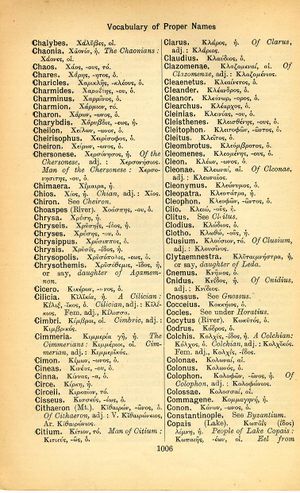Cineas: Difference between revisions
οὐκ ἐπιθυμήσεις τὴν γυναῖκα τοῦ πλησίον σου → thou shalt not covet thy neighbor's wife, thou shalt not covet thy neighbour's wife, you shall not covet your neighbor's wife, you shall not covet your neighbour's wife
m (Text replacement - "}}]]" to "}}]]") |
m (Text replacement - "(|thumb)\n(\|link=)" to "$1$2") |
||
| Line 1: | Line 1: | ||
{{WoodhouseENELnames | {{WoodhouseENELnames | ||
|Text=[[File:woodhouse_1006.jpg|thumb | |Text=[[File:woodhouse_1006.jpg|thumb|link={{filepath:woodhouse_1006.jpg}}]]Κινέας, -ου, ὁ. | ||
|link={{filepath:woodhouse_1006.jpg}}]]Κινέας, -ου, ὁ. | |||
}} | }} | ||
{{Lewis | {{Lewis | ||
Revision as of 16:55, 18 May 2020
English > Greek (Woodhouse)
Κινέας, -ου, ὁ.
Latin > English (Lewis & Short)
Cīnĕas: ae, m., = Κινέας,
I the friend of king Pyrrhus of Epirus, who counselled him to make peace with the Romans, he is said to have had a remarkably retentive memory, Cic. Tusc. 1, 24, 59; id. Sen. 13, 43; id. Fam 9, 25, 1; Plin. 7, 24, 24, § 88; 14, 1, 3, § 12; Sen. Contr 1, prooem. p. 65 Bip.
Latin > French (Gaffiot 2016)
Cīnĕās,¹⁶ æ, m. (Κινέας), ambassadeur de Pyrrhus : Cic. Tusc. 1, 59.
Latin > German (Georges)
Cīneās, ae, m. (Κίνέας), ein Thessalier, Freund u. Diener des Pyrrhus, Königs von Epirus, Anhänger der epikurëischen Philosophie, Nachahmer des Demosthenes in der Beredsamkeit, auch Schriftsteller über das Kriegswesen, Cic. Tusc. 1, 59; ep. 9, 25, 1.

